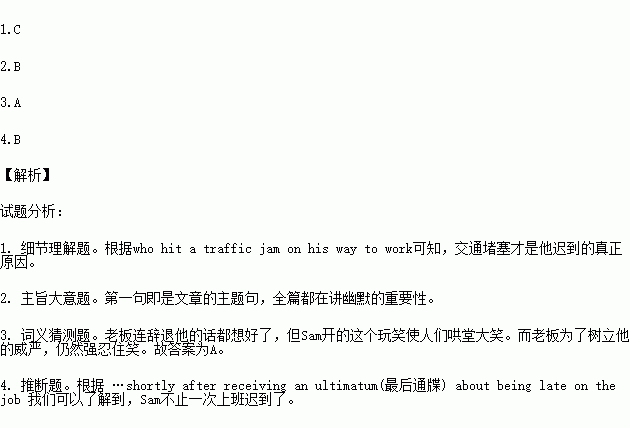题目内容
阅读理解。
A lot of us lose life’s tough battles by starting a frontal attack—when a touch of humor might well enable us to win.Consider the case of a young friend of mine,who hit a traffic jam on his way to work shortly after receiving an ultimatum about being late on the job.Although there was a good reason for Sam’s a being late—serious illness at home—he decided that this by-now-familiar excuse wouldn’t work any longer.His supervisor was probably already pacing up and down preparing a dismissal speech.
Yes,the boss was.Sam entered the office at 9:35.The place was as quiet as a locker room;everyone was hard at work.Sam’s supervisor came up to him.Suddenly,Sam forced a grin and stretched out his hand.“How do you do!” he said.“I’m Sam Maynard.I’m applying for a job,which,I understand,became available just 35 minutes ago.Does the early bird get the worm?”
The room exploded in laughter.The supervisor clamped off a smile and walked back to his office.Sam Maynard had saved his job—with the only tool that could win,a laugh.
Humor is a most effective,yet frequently neglected,means of handling the difficult situations in our lives.It can be used for patching up differences,apologizing,saying “no”,criticizing,getting the other fellow to do what you want without his losing face.For some jobs,it’s the only tool that can succeed.It is a way to discuss subjects so sensitive that serious dialog may start a quarrel.For example,many believe that comedians on television are doing more today for racial and religious tolerance than people in any other forum.
1.Why was Sam late for his job?
A.Because he was ill.
B.Because he got up late.
C.Because he was caught in a traffic jam.
D.He was busy applying for a new job.
2.The main idea of this passage is ________.
A.Sam Maynard saved his job with humor
B.humor is important in our lives
C.early bird gets the worm
D.humor can solve racial discriminations
3.The phrase “clamped off” in Paragraph 3 means ________.
A.tried to hold back B.tried to set
C.charged D.gave out
4.Which of the following statements can we infer from the passage?
A.Many lose life’s battles for they are lacking in a sense of humor.
B.It wasn’t the first time that Sam came late for his work.
C.Sam was supposed to come to his office at 8:30.
D.Humor is the most effective way of solving problems.
 天天向上一本好卷系列答案
天天向上一本好卷系列答案 小学生10分钟应用题系列答案
小学生10分钟应用题系列答案
